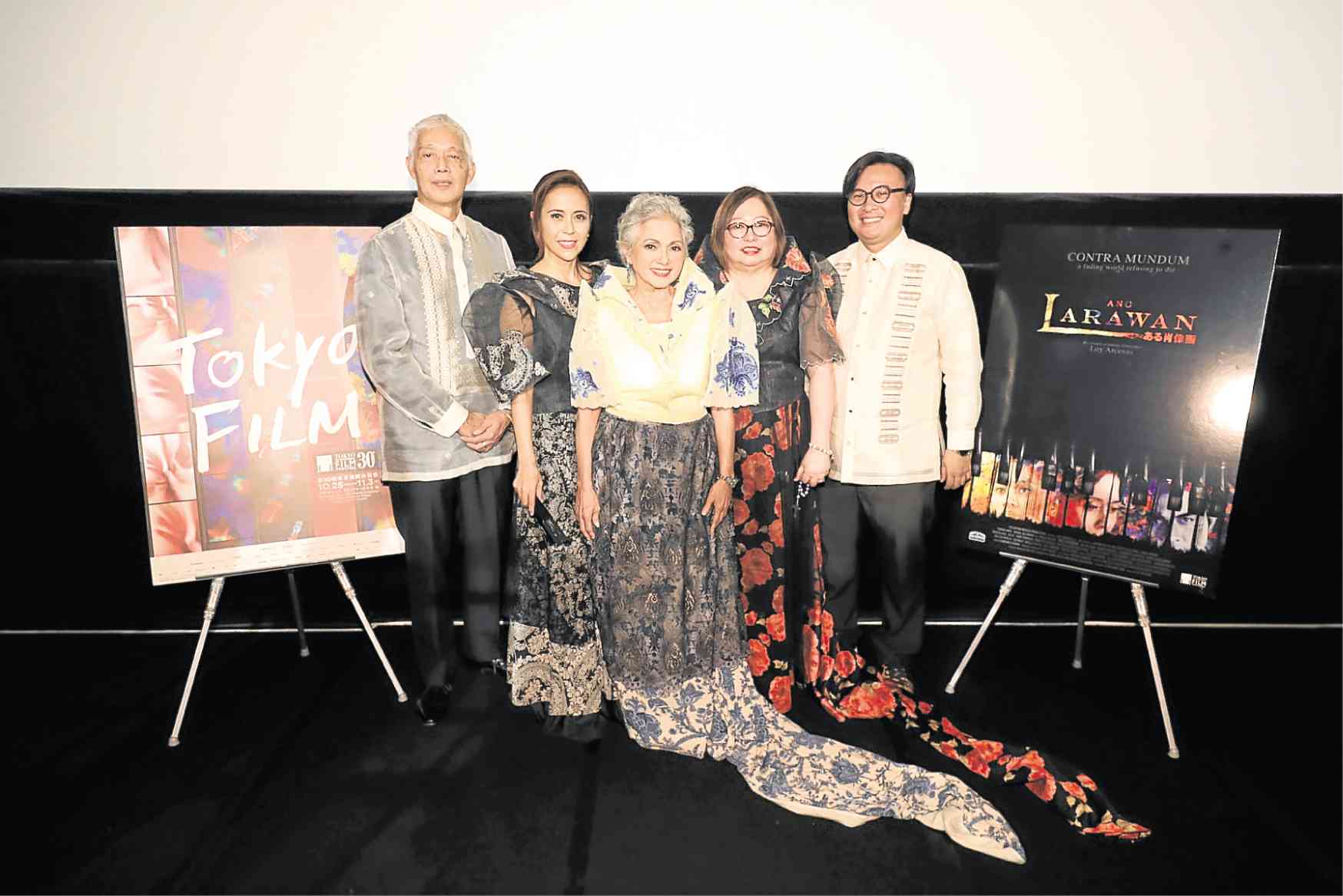
In full Filipiniana regalia (from left): Loy Arcenas, Rachel Alejandro, Celeste Legaspi, Girlie Rodis and Alemberg Ang —Photo courtesy of Tokyo International Film Festival
TOKYO—Philippine music, and culture in all its delightful diversity, took center stage in the 30th edition of this A-list film festival.
During screenings of two movies that competed in the Tokyo fest’s Asian Future section, Filipino artists got to showcase their musical abilities, as well.
Actor-producers Celeste Legaspi and Rachel Alejandro performed a duet from Loy Arcenas’ “Ang Larawan,” “Kay Sarap ng Buhay Nung Araw,” in full Filipiniana regalia.
A day before the performance, the weather was stormy and Legaspi expressed concern that her baro’t saya (made by production designer Gino Gonzales) would get soaked in the downpour. But on the day of the premiere, the sky miraculously cleared up. “There was no rain. As if the heavens were happy for us,” Legaspi recalled.
Legaspi shared with the Inquirer that Japanese viewers seemed as reticent as their Filipino counterparts and were too shy to ask questions. “But after our surprise song number, many viewers, young and old alike, approached us to say how much the film had moved them.”
“They asked for autographs and photos,” Alejandro recounted. “Two audience members told us that they loved the film, and another one said she got so emotional she couldn’t speak and ask her a question during the Q&A. A reporter confided that he had watched it twice, to better understand the story.”
Rachel Alejandro (left) and Celeste Legaspi sing a duet of “Kay Sarap ng Buhay Nung Araw.” Photos courtesy of the Tokyo International Film Festival
“All in all,” Legaspi enthused, “it was a very warm, fulfilling experience … worth the difficulty of being in baro’t saya.”
Director Arcenas related that, after the second screening, Legaspi treated the “almost-sold-out” crowd to another impromptu performance: “La Vie en Rose” in Filipino (as translated by National Artist Rolando Tinio, who wrote the libretto of “Ang Larawan”), English and French a cappella.
“That ended our Q&A on a high note,” he quipped.
Arcenas turned wistful: “It has been four years since the producers, Celeste and Girlie (Rodis), offered me the chance to direct this film. It has been an exhilarating journey for me and the entire ‘Larawan’ family. It is now time to offer it to the world and let it take its own journey.”
Next stop for “Ang Larawan” is the Cinematografo fest in San Francisco, California (Nov. 9 to 12), where it’s the opening film.
In a Nov. 1 essay, Variety’s Richard Kuipers gave “Ang Larawan” a rave review, hailing it as “stirring … handsomely produced … impeccably performed and crisply photographed.”
Akio Fujimoto’s “Passage of Life” (Japan-Myanmar) won the top prize in the Asian Future section.
Arnel “Arbi” Barbarona also got to present indigenous music after a screening of his Asian Future entry, “Tu Pug Imatuy” (The Right to Kill). “I played a handcrafted boat lute, which we call kudlung in our tribe,” he explained. “It’s an original Manobo string instrument.”
He related that foreign viewers seemed “amazed by our culture.” “I performed a song titled ‘Laisan,’” he reported.
Most of the questions revolved around his film’s theme, which tackled the armed conflict in Mindanao and the situation of the Lumad community. “They wanted to know if the cast members were real Lumad or professional actors. They were curious about the meaning of the title.”
He explained that “most of the main actors were Lumad,” except for his daughter Jillian Khayle Barbarona.
“I told the audience that the title is not a declaration, but a question,” he clarified. “Who has the right to kill? The Lumad, to protect themselves from the military? The soldiers, who look at Lumad as lower-class citizens? The rebels and soldiers, who want to win a war? Or the capitalists, who destroy the environment for profit?”
As bonus, Japanese viewers queued up in an orderly fashion, to get the autographs of Legaspi, Alejandro, Arcenas and Barbarona after their respective screenings.
Rachel Alejandro (left) and Celeste Legaspi sing a duet of “Kay Sarap ng Buhay Nung Araw.” Video courtesy of Girlie Rodis
Arnel “Arbi” Barbarona perform “Laisa.” Video courtesy of Arnel Barbarona